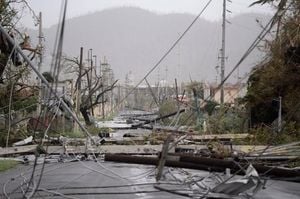On August 16, 2025, the National Council of Educational Research and Training (NCERT) released a set of special educational modules to mark Partition Horrors Remembrance Day, igniting a passionate debate across India’s political and academic circles. These modules, tailored for both middle and secondary school students, delve into the traumatic events surrounding the Partition of India in 1947 and assign explicit responsibility to Muhammad Ali Jinnah, the Congress leadership, and then Viceroy Lord Mountbatten for the division of the subcontinent.
The modules—published separately for Classes 6-8 and 9-12, in both English and Hindi—are not part of the regular curriculum. Instead, they serve as supplementary resources, designed to encourage debates, poster-making, and discussions among students. Their release coincides with Prime Minister Narendra Modi’s 2021 declaration that August 14 would be observed as Partition Horrors Remembrance Day, a move intended to honor the memory of millions displaced or killed during the cataclysmic upheaval.
NCERT’s new material pulls no punches when it comes to identifying the principal actors behind Partition. In a section pointedly titled “Culprits of Partition,” the modules state: “Jinnah, who demanded it; second, the Congress, which accepted it; and third, Mountbatten, who implemented it.” According to Kashmir Observer, the modules argue that the “wrong ideas” and political miscalculations of these three figures led to an event that “was not inevitable.”
The modules assert that the Muslim League’s Lahore Resolution of 1940, championed by Jinnah, set the stage for Partition by declaring that Hindus and Muslims were fundamentally different in “religious philosophies, social customs, and literatures.” The senior module goes further, linking the demand for Pakistan to a belief in “political Islam,” which it claims “rejects any permanent equality with non-Muslims.” Jinnah is described as the “able lawyer-leader” of this movement, while the Congress is criticized for accepting Partition plans and underestimating Jinnah’s resolve.
Lord Mountbatten’s role is cast in a particularly critical light. The modules note that he advanced the transfer of power from June 1948 to August 1947, a decision described as “a great act of carelessness.” According to Business Standard, this haste left Sir Cyril Radcliffe with only five weeks to draw the new borders, resulting in chaos so profound that “millions of people did not know whether they were in India or in Pakistan” even days after Independence. The modules contend that none of the Indian leaders had experience running a national administration or security apparatus, and that “such haste would not have been made” had they anticipated the scale of the problems to come.
The human cost of Partition is laid bare in stark detail. The modules, as reported by Herald Goa, describe the event as “an unprecedented human tragedy, with no parallel in world history.” They document the displacement of nearly 15 million people, mass killings, and widespread sexual violence. One section recounts how “trains of refugees arrived filled only with corpses, having been slaughtered en route.” The modules also recall the violence that erupted even before Partition was finalized, citing the horrific events in Noakhali and Calcutta (1946), and Rawalpindi, Thoha, and Beval (March 1947).
The political calculus behind Congress’s acceptance of Partition is explored through direct quotations from historic leaders. Jawaharlal Nehru, in a July 1947 speech excerpted in the modules, said: “We have come to a stage when we must either accept division or face continued conflict and chaos. Partition is bad. But whatever the price of unity, the price of civil war would be infinitely greater.” Sardar Vallabhbhai Patel is quoted as describing the situation as “explosive,” and that Partition was “bitter medicine.” Mahatma Gandhi’s stance is also included: he opposed Partition, but stated he would not resist Congress’s decision through violence, saying, “He said that he could not be a party to the Partition, but he would not stop Congress from accepting it with violence.”
Interestingly, the modules reveal that even Jinnah himself did not expect Partition to materialize in his lifetime. He is quoted as admitting to an aide, “I never thought it would happen. I never expected to see Pakistan in my lifetime.” The modules also highlight Jinnah’s earlier warning to Congress leaders: “Either a divided India or a destroyed India,” a statement that, according to the texts, pressured Nehru and Patel into conceding to Partition.
Beyond recounting the events of 1947, the NCERT modules draw a direct line from Partition to contemporary challenges. They argue that the Kashmir conflict, recurrent wars with Pakistan, and India’s high defense expenditures are all “consequences of Partition.” The modules assert, “Pakistan has waged three wars to annexe Kashmir and, after losing them, adopted a policy of exporting jihadist terrorism... All this is a consequence of Partition.” They note that some countries continue to aid Pakistan and exert pressure on India in the name of Kashmir, complicating India’s foreign policy to this day.
The enduring social impact of Partition is not overlooked. A section titled “Long-Term Losses — still ongoing” laments that “internal communal suspicion and animosity between Hindus and Muslims persist,” a legacy that continues to shape India’s political and social landscape. The modules warn that “shortsightedness in rulers can become a national catastrophe,” and that “giving concessions to violence to gain peace results in whetting the appetite of violence-prone groups.”
For educators and students, the modules serve as a cautionary tale. They emphasize that the horrors of Partition must be recalled not just to remember the suffering, but to draw lessons for the future: to reject communal politics and ensure that leadership always puts national welfare above personal or party interests. As Business Standard notes, the modules conclude with a call to action: “Recalling the horrors of Partition is crucial only if India draws lessons, rejecting communal politics and ensuring leadership that prioritises national welfare over personal or party interests.”
While the modules have sparked debate about historical interpretation and responsibility, they undeniably open the door for a new generation to engage with one of the most defining—and devastating—moments in India’s history. Through frank discussion and reflection, perhaps the country may yet find ways to heal old wounds and move forward with greater understanding.





